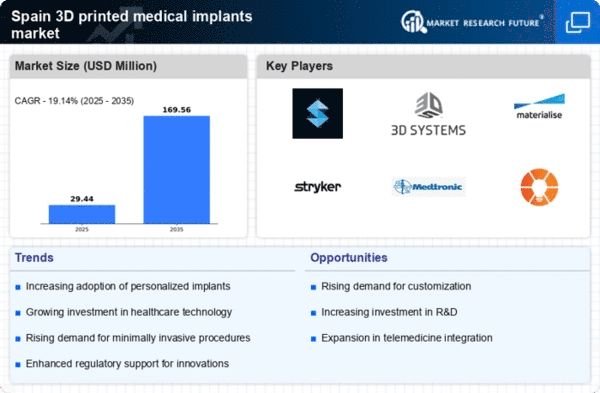Technological Advancements in 3D Printing
The 3d printed-medical-implants market is experiencing rapid growth due to continuous technological advancements in 3D printing techniques. Innovations such as bioprinting and the use of advanced materials are enhancing the quality and functionality of medical implants. In Spain, the integration of artificial intelligence and machine learning in the design process is streamlining production, reducing costs, and improving patient outcomes. The market is projected to grow at a CAGR of approximately 25% over the next five years, driven by these technological improvements. Furthermore, the ability to create complex geometries and customized implants tailored to individual patient needs is revolutionizing the healthcare landscape, making 3D printing a pivotal component in the medical field.
Cost Efficiency and Reduced Production Time
Cost efficiency and reduced production time are critical factors propelling the 3d printed-medical-implants market. Traditional manufacturing methods often involve lengthy processes and high material costs. In contrast, 3D printing allows for rapid prototyping and production, significantly decreasing lead times. In Spain, healthcare institutions are increasingly recognizing the financial benefits of adopting 3D printing technologies, with potential savings of up to 40% in production costs. This efficiency not only enhances the accessibility of medical implants but also enables healthcare providers to allocate resources more effectively. As hospitals and clinics strive to optimize their operations, the demand for cost-effective 3D printed solutions is likely to rise, further driving market growth.
Growing Aging Population and Chronic Diseases
The growing aging population and the prevalence of chronic diseases are significant drivers of the 3d printed-medical-implants market. As the population in Spain ages, the demand for medical implants is expected to rise, particularly for orthopedic and dental applications. The increasing incidence of chronic conditions such as diabetes and cardiovascular diseases further amplifies this demand. According to recent statistics, the number of individuals aged 65 and older is projected to reach 9 million by 2030, creating a substantial market for customized medical solutions. This demographic shift necessitates innovative approaches to healthcare, positioning 3D printed implants as a viable solution to meet the evolving needs of the population.
Supportive Government Initiatives and Funding
Supportive government initiatives and funding are playing a pivotal role in the expansion of the 3d printed-medical-implants market. The Spanish government has been actively promoting research and development in advanced manufacturing technologies, including 3D printing. Various funding programs and grants are available to support innovation in the medical sector, encouraging collaboration between universities, research institutions, and industry players. This support is expected to enhance the capabilities of local manufacturers and stimulate the development of new 3D printed medical solutions. As a result, the market is likely to benefit from increased investment and innovation, fostering a conducive environment for growth and advancement in medical implant technologies.
Rising Demand for Personalized Healthcare Solutions
The increasing demand for personalized healthcare solutions is a significant driver for the 3d printed-medical-implants market. Patients and healthcare providers are seeking tailored solutions that cater to individual anatomical and physiological requirements. In Spain, this trend is reflected in the growing adoption of 3D printed implants that offer enhanced compatibility and reduced recovery times. The market is witnessing a shift towards patient-centric approaches, with a projected increase in the use of customized implants by over 30% in the coming years. This demand is further fueled by advancements in imaging technologies, which allow for precise modeling and design of implants, thereby improving surgical outcomes and patient satisfaction.
















